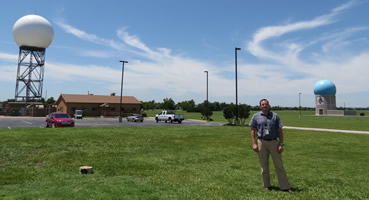
The goal of signal processing is to extract the maximum amount of information from a signal. In the context of weather radars, this includes all the manipulations needed to transform the received weather signals (a.k.a. time-series data) into clean measurements of water content, wind velocity, and other meteorological variables.
Weather radar signal processing focuses on three main problems:
For more information about the weather radar signal processing projects that I'm currently working on, click on any of the following links:
We recently received a second award from the National Science Foundation (NSF) for our research project "Understanding the Relationship Between Tornadoes and Debris Through Observed and Simulated Radar Data."
This fall, I had the honor and privilege to teach an OLLI class with my friend and colleague Jami Boettcher. "NEXRAD Weather Radar: How it Works and What Those Images Tell Us" kept us busy for 5 weeks this fall.
Our paper "Bootstrap Dual-Polarimetric Spectral Density Estimator" made the cover of the April 2017 issue of the IEEE Transactions on Geoscience and Remote Sensing journal.
I have accepted to serve as an associate editor for the American Meteorological Society’s Journal of Atmospheric and Oceanic Technology.
I have been chosen as the winner of the 2016 OU College of Atmospheric and Geographic Sciences Dean’s Award for Outstanding Service.